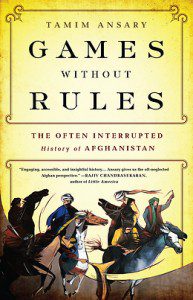Review of Games Without Rules: The Often Interrupted History of Afghanistan, by Tamim Ansary
Given the length of the American attention span, it’s useful to remind people from time to time that American forces are still deployed in Afghanistan. Despite (unwise?) campaign promises, President Obama has not only not removed troops from the ground in Central Asia, but has dedicated us to at least another two years there. While this is not the reason I originally started to Tamim Ansary’s excellent history of Afghanistan, Games Without Rules: The Often Interrupted History of Afghanistan, it was something that kept coming to mind through the book.
(In case you’re wondering, I started reading it because it was a free download from my local library. Ansary is an excellent narrator, and I highly recommend the audiobook if you are into that sort of thing.)
And, before getting too much more into the review proper, I should point out that this is not my area of expertise. My knowledge of the history and politics of Central Asia is limited to 1) personal and informal conversations with experts on the region, former soldiers who served there, and missionaries; 2) some study of the ancient world; and 3) Josiah Harlan, who was awesome. So kindly excuse any errors of fact or analysis—they are entirely mine and not to be blamed on Mr. Ansary.

So, from my non-expert perspective, here are a few points that jumped out from this book:
1) Contrary to what we might think, the conflict in Afghanistan is not so much “radical Muslim” vs. “secular Westernizers” as it is traditionalist rural communities vs. cosmopolitan urbanites. Of course, in this particular setting fundamentalist Islam tends to be more appealing to the rural communities, while secularism plays better in the cities, but at least as Americans with a pretty hefty red state/blue state divide we shouldn’t see the conflict in Afghanistan as completely alien to us.
2) Much of the current mess in Afghanistan is not the fault of the United States. Granted, Afghanistan has always been something of a mess (what nation hasn’t?), but the specific problems of the 1990s and 2000s were caused most directly by the Soviet invasion. Prior to that, Afghanistan had been staggering and listing towards modernization under a series of careful leaders. The rural/urban split mentioned above preceded the Soviets, but Ansary suggests that the biggest problems in the nation pre-Communism were caused by urban leaders who pushed too hard and too fast towards modernization and generated a reaction from the rural countryside against immorality, Westernization, or both. Leaders in the wake of these reactions would eventually push modernization again, albeit more cautiously and incrementally.
The Soviet invasion upset this back-and-forth first by intentionally destroying the rural communities that resisted communism (because it was modern, Western, and secular) in an aggressive campaign of extermination; and second by leaving no clear authority behind in the urban centers so that when the Soviets withdrew the cities were torn apart by civil war. The result of this combined destruction of the rural and urban in Afghanistan was that the long-standing traditions which had softened the rough edges of Islam and Westernization alike (a tradition of generous hospitality, for example) were destroyed and a replaced by a generation of people who knew nothing but either fighting the Soviets or living in refugee camps.
To use yet another American example—think of what the hyper-partisan political landscape looks like today, and then ask yourself what the effect is going to be on a generation of citizens raised who never knew a Congress where Democrats and Republicans got along with each other, despite their political differences. This is obviously little better than a pale reflection of an Afghanistan torn apart by war, where the best of the past has been lost, apparently leaving only two unattractive options: secularized Westernism or radical Islam. So, you know, thanks, communism…
3) The preceding point is not to say that the United States is blameless when it comes to the current state of Afghanistan. We are (and always have been) terrible nation-builders, but so far in Afghanistan we have really dropped the ball. Ansary’s telling of our sidelining the Afghan King is probably the best example—the one man who would have served as a point of connection between the past and the present, and been capable of working respectfully with all of the major factions in Afghanistan was directly rejected by the United States in favor of our own candidate for leadership who won by a highly suspect landslide. The message, according to Ansary, was clear: become a free and independent republic, but we’ll tell you who your leader will be.
4) Despite the Soviet destruction of Afghanistan and American fumbling in the past decade, not all is lost. There is some hope of uniting the rural and urban elements of Afghanistan into one culture that holds together in a relatively free modern nation while simultaneously clinging to its traditional Muslim roots. Ironically, according to Ansary, this hope comes primarily from… the Taliban.
[Spoiler alert—if that can be applied to non-fiction.]
If the problem is that the rural communities have always been resistant to outside pressure towards modernization (whether backed by progressive Afghans, the British, the Soviets, or the Americans hardly seems to have mattered in Afghan history), then the Taliban has unintentionally made great strides in overcoming this problem. Specifically, the Taliban has been using opium to fund its war—opium purchased from rural communities in exchange for consumer goods like motorcycles, generators, computers, cell phones, and televisions. In effect, they have done what the Soviets and America both failed to do: begun the process of fundamentally shifting the rural way of life into something much more modern. Just as today you will see farmers and ranchers in the American West with iPhones, so the rural life of Afghanistan is beginning to catch up to modern times.
(Of course, all of that is assuming that the problem is bringing the rural communities into the modern world. If we were Taliban, we would say that the problem is bringing the urban centers back to the traditional Muslim way of life…)
All of the preceding are points I make as a political scientist (and I hope that I make these with some degree of generosity). As a Christian, too, I affirm that we ought always to encourage our government to act towards Afghanistan and its people with justice, humanity, and respect. We could argue about the details of what that looks like on the ground, but we must begin with that as our motivation. And I suspect even a good secular humanist would agree with me on that.
Yet for Christians this is a secondary point. An important second, to be sure, but it is still only second. Our primary concern as Christians ought to be getting the Gospel into Afghanistan— this is at least one place where I am absolutely Machiavellian in my perspective. Now is the time for aggressive missions work—and this is something which we ought to take advantage of with every ounce of political strategy and acumen we can muster. We have a very brief window of time where Afghanistan is slightly safer for missionaries. Not safe, mind you; but slightly safer. While “safety” ought not be the number one priority of a missionary in the first place, it may be a consideration. There are certainly times when we send out people knowing that they will be martyred for the sake of the Cross, but that is at least momentarily less likely now in Afghanistan.
All that to say, Games Without Rules is an excellent and useful read and I am happy to encourage Christian and non-Christian alike to take up and read.
Dr. Coyle Neal is an Assistant Professor of Political Science at Southwest Baptist University in Bolivar, Missouri.













